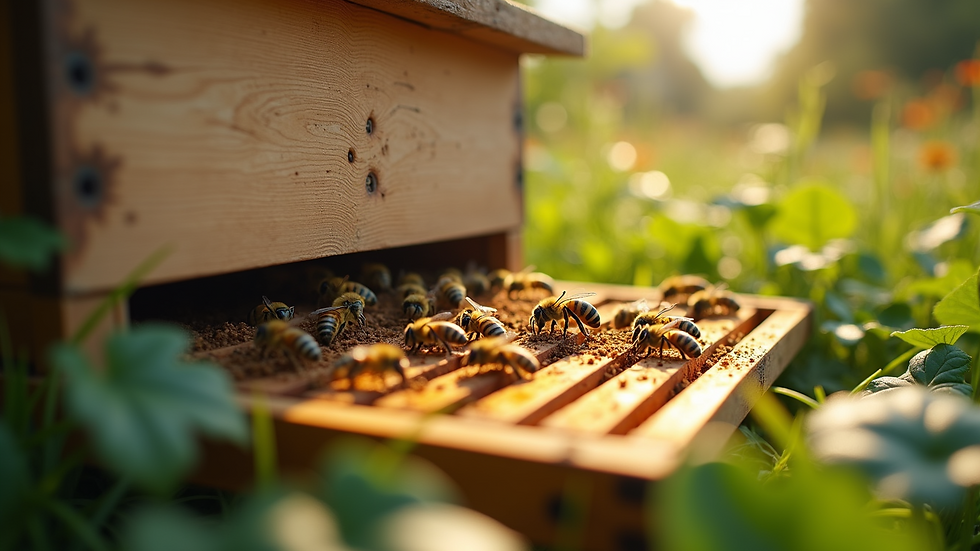The Role of Beekeepers in Supporting Local Ecosystems
- Harry KH.

- Jul 7, 2025
- 4 min read
Beekeeping is more than just a hobby; it plays a vital role in sustaining local ecosystems. Bees are crucial pollinators that facilitate the growth of many plants, trees, and crops. Without their hard work, our food systems and natural landscapes would struggle to survive. Local beekeepers actively contribute to this process, and their efforts are essential for maintaining healthy, thriving environments.
The Importance of Local Beekeepers
Local beekeepers are foundational in promoting biodiversity. By tending to hives and ensuring the health of bee populations, they facilitate the pollination of various plants, contributing to a balanced ecosystem. Research shows that nearly 75 percent of the world's food crops depend on pollination. In addition, bees help in the propagation of wildflowers and native plants that sustain local wildlife, including birds and other beneficial insects.
Through their efforts, beekeepers encourage genetic diversity among plants, enhancing resilience against pests and diseases. For instance, a study published in the journal Nature indicated that local bee populations can lead to a significant increase in fruit and seed production. This, in turn, supports the web of life interconnected with our agricultural systems.

How Beekeepers Impact the Environment
Beekeepers play an active role in environmental stewardship. They monitor hive health, educate the community about the importance of pollinators, and participate in reforestation or wildflower planting projects. Each of these actions aids in restoring and nurturing local ecosystems.
For example, volunteer efforts by beekeeping groups often target local parks and community gardens. By planting bee-friendly flowers, they create habitats for both bees and other pollinators. This not only increases food sources for bees but also enhances prettier and more biodiverse landscapes.
Beekeeping also promotes sustainable agricultural practices. Many local farmers are collaborating with beekeepers to introduce hives to their farms. This mutual relationship boosts crop yields while providing bees with more foraging opportunities. Reporting from the Journal of Economic Entomology states that pollination can increase fruit yield by up to 30 percent, showcasing just how significant bee activity is to food production.

Can I Keep Bees in My Backyard in Perth?
Yes, keeping bees in your backyard in Perth is an excellent way to contribute to local ecosystems. However, it's crucial to check local regulations and guidelines to ensure responsible beekeeping. You may need to register your hives, follow specific zoning laws, or obtain permits.
For the best experience, consider taking a beekeeping course. Numerous workshops and classes in Perth cover everything from hive management to bee biology, encouraging individuals to start beekeeping with a solid foundation of knowledge. This investment in education pays off not just in your garden but also in the local ecosystem by enriching the bee population in your area.
Before you start, select a location for your bees that is safe from heavy traffic and hazards. Make sure there are ample flowering plants nearby to keep your bees healthy and productive. With the right start, backyard beekeeping can become a fulfilling hobby that plays a part in preserving the environment.

The Benefits of Local Honey Production
Local honey is much more than a sweet treat; it comes with various health benefits. Consuming locally produced honey can assist in building immunity against local allergens, as it contains trace amounts of pollen from nearby plants. This practice is especially beneficial for allergy sufferers; local honey can help your body adapt to the area's allergenic substances.
Besides health benefits, consuming local honey supports economic growth in the community. By purchasing honey from local beekeepers, consumers are investing in sustainable farming and promoting environmental awareness. The local market for honey also creates jobs and encourages small business ventures among residents.
Moreover, local honey production often supports initiatives to protect bee habitats. Beekeepers who sell honey are motivated to ensure that their bees have a healthy environment in which to thrive. This includes advocating for policies that protect natural spaces and pollinator habitats, which can lead to broader community efforts in conservation.
In summary, local honey not only tastes wonderful but serves as a symbol of the symbiotic relationship we have with nature and the local ecosystem.
Getting Involved in Beekeeping
If you're inspired by the idea of supporting ecosystems through beekeeping, consider getting involved. Here are some actionable recommendations for aspiring beekeepers:
Educate Yourself: Attend local beekeeping clubs or workshops to learn the basics and best practices.
Start Small: Begin with one or two hives to understand the commitment and maintenance required.
Network: Connect with local beekeepers to share experiences, tips, and resources. Engaging with a community of beekeepers can provide valuable insights and spark new interests.
Use Bee-Friendly Practices: Avoid harmful pesticides and recommend planting native plants that thrive in your region, providing a harmonious environment for bees.
Taking the plunge into beekeeping doesn't just assist the bees and local ecosystems; it can also enrich your life with new skills, relationships, and fulfillment.
As you consider your role in the eco-system, remember that every effort counts. Whether you are a seasoned beekeeper or a potential new enthusiast, your involvement can make a significant difference. For those interested in exploring more about becoming a bee keeper, Perth has many resources available online, including links to local beekeeping associations and support groups like bee keeper perth.
In summary, local beekeepers serve as crucial allies in the fight for ecological balance. Through their passion and commitment, they not only foster healthy bee populations but also enhance biodiversity and sustainable agriculture. It’s time to recognize their vital role and join the movement to protect one of nature’s most invaluable resources.




Comments